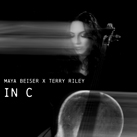Articles
yMusic
Beiser / Susman
Albums
Bayaka Pygmies
Maya Beiser
James Blackshaw
Caffeine Patrol
Call Super
Andrea Carri
Causa Sui
Matthew Collings
Philip Corner
Crandell & Timson
Gareth Dickson
Dryft
Jordan Dykstra
Roman Flügel
Future 3
Graveyard Tapes
Hildur Gudnadottir
Mary Halvorson
Hecq
Idlefon
Yuta Inoue
Jacaszek & Kwartludium
Franz Kirmann
Lachrylic
Machinone
Null
Ocoeur
Octet Ensemble
Oliveros/Rothenberg/Hill
Glen Porter
Gabriel Prokofiev
Rob Reed
Steve Roach
The Sticks
Tangent
Tapage
Taylor | Grosse
Transllusion
Weathers & Chrisman
yMusic
Yokotsuka Yuuya
Compilations / Mixes
Calyx & TeeBee
Deetron
Total 14
EPs / Cassettes / Mini-Albums / Singles
Blu Mar Ten
Break / Fields
Elika
William Ryan Fritch
Andy Vaz

Maya Beiser: Uncovered
Innova Records
Anyone suspecting Maya Beiser might be slumming in releasing a collection of classic rock covers will most assuredly have that notion dispelled after a single run-through of Uncovered. It quickly becomes apparent that the New York-based cellist brings the same level of conviction to the recording's ten performances as she would to a more conventional piece in the classical repertoire, something on the order, say, of John Tavener's The Protecting Veil.
Vocals by Beiser—more spoken word than singing, actually—appear on the opening song, “Black Dog” (“Hey, hey mama, say the way you move…”), but thankfully nowhere else. It's not that Beiser has an unappealing voice, but that any attempt to match the vocal performances in the originals obviously would be foolish when the likes of Robert Plant and Kurt Cobain are involved. Beiser's aware that the better strategy is to use the cello as her voice, and certainly one of the recording's major strengths is the emotionally raw quality of her playing, which is alternately bluesy, mournful, and ecstatic. While she often does hew to the vocal melodies in the original song, she's not constrained by them, and there's no lack of passion in her delivery.
A couple of the tunes are beefed up with the addition of guests such as drummers Glenn Kotche (Wilco) and Hubert Zemler and bassists Jherek Bischoff and Otto Briner, but Uncovered is largely a solo undertaking, and thus one tailor-made for cello aficionados. Though producer Evan Ziporyn, like Beiser an ex-Bang On A Can All-Star, appears on one track only, his clarinet and bass clarinet contributions to Beiser's rendering of King Crimson's “Epitaph” significantly enhance the piece's impact. Anything but a slapdash affair, Uncovered features arrangements by Ziporyn that are multi-layered, thoughtfully considered, and rich, such that a given piece typically features intricate webs of Beiser's cello playing as opposed to a single lead line. A case in point is her rendition of “Summertime” (inspired by Janis Joplin's version), where multiple cellos roar in communal supplication.
The set-list reveals Beiser to be a child of the ‘60s, someone who grew up as captivated by Hendrix and Joplin as Bartok and Stravinsky. Consequently, the selections reflect her personal taste as opposed to choices dictated by some sales-hungry PR person—it's telling that the most recent song is “Lithium,” which appeared on 1991's Nevermind, as opposed to some recent chart-topper. One might quibble over a few of the selections for being obvious choices—AC/DC's “Back in Black” and Led Zeppelin's “Kashmir,” for example—though to her credit Beiser includes “Lithium” and “Wish You Were Here” over the more familiar “Smells Like Teen Spirit” and “Money.”
Kotche and Bischoff channel John Bonham and John Paul Jones convincingly on “Black Dog” while Beiser does much the same in recreating Page's and Plant's wailing guitar and vocal lines. But while “Lithium” and “Back in Black” are as hard-hitting, it's actually the less frenzied covers that are the most memorable. Material such as Howlin' Wolf's blues-soaked “Moanin' at Midnight,” Hendrix's “Little Wing,” and “Wish You Were Here” affords the cellist a greater opportunity to demonstrate nuance and showcase her emotional side. The album's ten songs are sequenced effectively, too, with ballad-styled settings framed by louder opening and closing songs. To these ears, the high point arrives halfway through in a gorgeous version of “Epitaph,” which Beiser and Ziporyn fashion into a majestic and powerfully moving set-piece that one guesses would make Fripp proud.
Let's not be coy: Uncovered's classic rock set-list makes it a marketer's dream, and the idea of a classically trained cellist doing covers of Pink Floyd and Led Zeppelin offers a strong PR hook. But Uncovered isn't the sound of Maya Beiser selling out; it's simply the document of an artist bringing equal amounts of passion and sincerity to a more familiar collection of music than the kind with which she might normally be associated.
October 2014